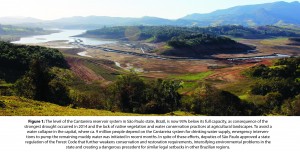PEDRO H.S. BRANCALION (1), JEAN PAUL METZGER (2), RICARDO R. RODRIGUES (3), ROBIN CHAZDON (4), SILVIO F.B. FERRAZ (1), CARLOS A. JOLY (5)
Two recent papers published in Science highlight major setbacks in Brazilian environmental policy [1, 2]. In spite of the warnings and mobilization of the scientific community and NGOs [3], the dismantling effort still goes on. In the first state regulation of the Forest Code, enacted in 2012 after a long and controversial process, deputies of São Paulo state approved a law – ratified by the State Governor in January 15, 2015 and available at http://s.conjur.com.br/dl/codigo-florestal-paulista.pdf – that expands the amnesty of the federal law, further reducing the requirements for conservation and restoration of native vegetation, while continuing to permit compensation of the remaining legal deficit of native vegetation in other states. Such legal setbacks compromise the capacity of the state to face major environmental challenges depending on native forest cover increase, including the risk of severe water shortages for most of its 44 million inhabitants (Figure 1) and future species extinctions [4, 5].

Rigorous scientific knowledge to support public policy in São Paulo [6, 7], the most wealthy and developed state of Brazil, is being ignored with regard to this Forest Code regulation. Instead of using this opportunity to strengthen its natural capital and to be a positive model for other Brazilian states, São Paulo’s regulation establishes a dangerous precedent that further weakens the new Forest Code. The approval of this law is part of a wider process of environmental setbacks in Brazil, including the transfer of decisions to delimit and create protected reserves and indigenous lands from technical executive agencies to legislative bodies. These changes in environmental policy diminish the application of relevant scientific knowledge, and expand the power of political influence, which is now strongly dominated by the agricultural sector. This agribusiness politic-oriented decision making partially explains why Brazil has not yet ratified the Nagoya protocol on biodiversity conservation, and is expected to bring new threats for the country that hosts most of global biodiversity.
- Departament of Forest Sciences, “Luiz de Queiroz” Collegue of Agriculture, University of São Paulo, 13418-900, Piracicaba, SP, Brazil.
- Department of Ecology, Institute of Bioscience, University of São Paulo, 05508-900, São Paulo, SP, Brazil.
- Departament of Biological Sciences, “Luiz de Queiroz” Collegue of Agriculture, University of São Paulo, 13418-900, São Paulo, SP, Brazil.
- Department of Ecology and Evolutionary Biology, University of Connecticut, 06269-3043, Storrs, CT, USA.
- Department of Plant Biology, Biology Institute, State University of Campinas, 13083-970, Campinas, SP, Brazil and Chairman of the BIOTA/FAPESP Program.
References
- B. Soares-Filho et al., Science 344, 363 (2014).
- J. Ferreira et al., Science 346, 706 (2014).
- J.P. Metzger et al., Science 329, 276 (2010).
- C. Banks-Leite et al., Science 345, 1041 (2014).
- M. Galetti et al., Science 342, 930 (2013).
- C. A. Joly et al., Science 328, 1358 (2010).
- B. Wuethrich, Science 315, 1070 (2007).
